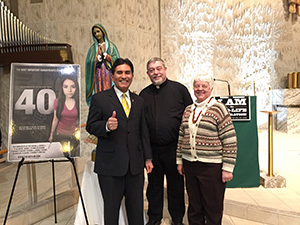If we can save just one life, then it’s mission accomplished. – John Morales of Pro-Life Champions
 John Morales with Deacon David Zampino, St. Margaret Mary Parish, Milwaukee, and Vicki Thorn at a screening (Photo submitted by John Morales)The executive director of a nonprofit that promotes human life through media identified the right to life as “the most important civil rights issue of our time” during a Jan. 11 evening appearance at St. Margaret Mary, Milwaukee.
John Morales with Deacon David Zampino, St. Margaret Mary Parish, Milwaukee, and Vicki Thorn at a screening (Photo submitted by John Morales)The executive director of a nonprofit that promotes human life through media identified the right to life as “the most important civil rights issue of our time” during a Jan. 11 evening appearance at St. Margaret Mary, Milwaukee.
John Morales, who also co-founded the nonprofit Pro-Life Champions, addressed some 60 people, ranging from teenagers to senior citizens, who braved snow and near-zero temperatures to hear him and watch a screening of “40,” a documentary he produced and directed.
Labeled “an emotionally powerful and intellectually stimulating must-see movie” by the magazine “Movieguide,” the documentary considers the effects of four decades of legalized abortion in America, while responding to pro-choice arguments.
“Our film is unique because it gives both sides of the story,” said Morales.
From sports reporter to pro-life advocatePrior to producing and directing the documentary “40,” Pro-Life Champions founder-executive director John Morales co-produced the 2007 movie “Champions of Faith: Baseball Edition.” The hour-long “Champions of Faith” documentary, for which Morales also served as writer and narrator, deals with sports and faith in major league baseball. Prior to speaking and the showing of “40” at St. Margaret Mary, Milwaukee, Jan. 11, Morales expressed delight that one of his two dozen “Champions of Faith” interviewees, Mike Piazza, a catcher for the New York Mets and other teams, had only days earlier been elected to the Baseball Hall of Fame. Morales worked for two decades in television and radio, including sports reporting and/or anchoring in Houston, Detroit and his native Chicago. “I could write a book on my experiences in the sports world,” said Morales, whose work venues included Fox Sports and ESPN. Among the highlights: doing color commentary for Chicago Bulls basketball games and receiving a pair of championship rings for his efforts, and being among hockey players celebrating Stanley Cup victories in their locker rooms. Morales told the Catholic Herald eventually “the good Lord took me from the sports world to the pro-life movement.” |
Morales, 57, addressed the issue’s importance in a civil rights sense by noting “without the right to life there are no other rights to talk about.”
He added that he spent two years making “40,” which includes many interview clips during its approximately 90 minutes, and pronounced himself “very passionate about abortion” – which he insisted is “not just a religious issue.”
The interviews provide “40” with something of “an all-star team of pro-life leaders,” Morales told the Catholic Herald prior to the screening.
One of the interviewees, Vicki Thorn, founder of the Milwaukee-based National Office of Post-Abortion Reconciliation and Healing, attended the event.
Others appearing on screen are David Bereit, national director of 40 Days for Life, an international pro-life group; Fr. Francis “Rocky” Hoffman, executive director of Relevant Radio; Fr. Frank Pavone, national director of Priests for Life; and Alveda King, director of African-American Outreach at Priests for Life and niece of Rev. Dr. Martin Luther King Jr., whose “I Have a Dream” speech is briefly excerpted in “40.”
“This movie is more relevant today than the day it premiered (in 2015),” Morales said, “because abortion is so much in the news.” He pointed out, by way of example, that President Obama just vetoed the defunding of Planned Parenthood.
“God has blessed this film in a huge way,” he said, noting it has been seen from Washington D.C.’s Heritage Foundation
Theatre to the Warner Bros. Studio lot, from the John Paul II International Film Festival in Florida to the University of Notre Dame, from Canada to California and approximately 20 other American states.
Publicly screened more than 200 times, including at St. Matthias, Milwaukee, last October, the documentary had been endorsed by the late Cardinal Francis George of the Chicago Archdiocese; that archdiocese’s former superintendent of schools, Dominican Sr. Mary Paul McCaughey; Emmy-winning journalist Sheila Liaugminas; and syndicated radio talk show host Drew Mariani.
A Chicago native, Morales, who “knew Archbishop (Jerome E.) Listecki when he was Fr. Listecki” in that city, resides with wife Cindy and son Joseph Dominic in Glenview, Illinois. He is intimately connected with the pro-life issue as he is post-abortive – having paid for a girlfriend’s abortion many years ago. He is also an adoptive father.
The abortion experience “left a hole in my heart,” Morales told the Catholic Herald, although “healing (came) through the sacrament of reconciliation.”
Because he and his wife could not conceive a child, they adopted Joseph Dominic shortly after the boy’s birth eight years ago. His “son could’ve been one of 58 million unborn children who perished since Roe v. Wade,” Morales mused.
“We need to be people of hope,” he suggested near the end of his presentation, referring to recent happenings: Planned Parenthood’s decision to reject reimbursement from researchers for aborted body parts; a Gallup Poll indicating 55 percent of Americans would like to see all or most abortions outlawed; abortion clinics closing at a record pace; scores of pro-life laws introduced at the state level; post-abortive women “talking like never before,” and negatively so, about the termination of their pregnancies while “the young people understand that a third of their peers (having been aborted) don’t exist.”
Morales concluded by quoting St. John Paul II, with whom he had an audience in 2002. During a 1987 visit to the United States, the pope said, “If you want equal justice for all and true freedom and lasting peace, then America, defend life.”
